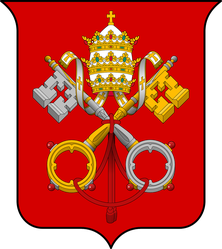Jesus did not go round Judea claiming to be the Son of God, and when, sitting on the hillside above Caesarea Phillippi he asked the apostles who men said that he was, he received a variety of answers. He was a prophet reincarnated, possibly Isaiah or Jeremiah, even John the Baptist, but no one said that they or anyone else regarded Jesus as divine. When Simon Peter told Jesus that he thought him the Christ, the messiah, there were no divine meanings to that term, and it denoted one holy in God's sight sent to save Israel.
Many people try to pigeonhole Jesus into pre-existing categories: he was a prophet, a story teller, a teacher of wisdom,a revolutionary,a rabbi, and the apostles were no exception to this tendency. Yet Jesus did not fit comfortably into the categories in which people placed him. He was all of them, yet more. There were experiences that seemed to draw on the understanding to transcend existing categories through which Jesus was seen, but the understanding lagged behind the experience and the full apprehension took time to mature.
Let us look at some of them. There was the transfiguration,[Mark 8] the time on Mount Tabor [so tradition has it] when Jesus seemed to glow with light. A sense of being in the presence of bright white light sometimes happens in a religious experience, but for the three apostles present Jesus was not having a religious experience, he was the religious experience, and he was being affirmed by the presence of God. This was a powerful indication that Jesus was someone special. Furthermore, his Word seemed to have power to command. In Mark 2 he displays unusual knowledge of the origins of the paralyzed man's condition, and his word of command touches the depths of the man's soul, forgiving his sins, an action that only God can do. We see the same power of the word in the case of Jairus' daughter in Mark 5, where he speaks to a clinically dead girl and restores her to consciousness.
He conducted himself as one with authority, and as Neil Wright, an Anglican bishop, says in Who Was Jesus, Jesus behaved as though he was in charge. This is confirmed by Bornkamm [writing in Jesus of Nazareth] who says that he was one who had innate authority.Jesus was therefore a big personality with an imposing charismatic presence. Furthermore,in Mark's Gospel we are told that unlike his fellow rabbis who taught by referring back to other rabbis, Jesus taught on his own authority, a practice that upset the religious and intellectual establishment of Israel at the time. But this makes him a challenge, you either stand for him or against him, but you cannot be neutral, so there were people who loved and committed to him, and there were others who were bitterly opposed. You either loved him or hated him, but you could not ignore him.
To be one of Jesus' disciples was to walk with a powerful charismatic figure whose words fired the soul and challenged listeners to holiness. It was, I believe,to walk with one who had a deeply holy presence, one who was close to God and drew listeners into that closeness. Yet none of the disciples regarded him as God, and the Transfiguration indicated that God was other than Jesus,who was his Son, but the term Son of God simply denoted to Jews a holy person close to God. So far therefore, no divinity, but great holiness. But the stage was prepared.






 Pilgrimage. A reviewon 06/15/2025
Pilgrimage. A reviewon 06/15/2025
 Leo the Fourteenthon 05/09/2025
Leo the Fourteenthon 05/09/2025
 The Melsonby Hoardon 03/25/2025
The Melsonby Hoardon 03/25/2025




Comments
No traditions on these questions have been preserved.
Thank you for your comment below in answer to my previous observation and question.
Our Lady Mary ascended into heaven. Does Christian tradition say whether or not she said anything, whether or not she was alone?
There probably were mediaeval legends, butbthere are no recorded last words.
Thank you!
So my comment in the second box below contains Jesus Christ's last words.
Is there any Christian tradition about the last words of Our Lady Mary and of St. Joseph?
All correct Well said.
Thank you for your comment in answer to my previous-day observation and question.
Jesus Christ acted as role model, savior and teacher, correct?
Might it be possible that He questioned, "My God why hast Thou forsaken me?" in order to then show us the Trust in God answer to all peril, "Into your hands I commit my spirit"?
The opinion varies. PROTESTANTS say that Jesus f9elt abandoned by God, a view that was invented by Luther in the ssixteenth century. However, Catholicism follows the traditional interpretation that Jesus words onnthe cross are from psalm 21, a prayer of hope of a good man in distress
Some online sources interpret Jesus Christ's words feeling forsaken on the Cross as going into the Crucifixion intending to survive with God's intervention.
What is the Christian tradition about expressing forsakenness and expiring after submitting His spirit to God?
I think that Jesus had the divine presence about him, and after the resurrection the jigsaw fell into place, and the disciples became aware of the significance of what he had been saying and doing.
The first paragraph to your first subheading, The Apostles' Experience, considers that "Jesus did not go round Judea claiming to be the Son of God, and when, sitting on the hillside above Caesarea Phillippi he asked the apostles who men said that he was, he received a variety of answers. He was a prophet reincarnated, possibly Isaiah or Jeremiah, even John the Baptist, but no one said that they or anyone else regarded Jesus as divine. When Simon Peter told Jesus that he thought him the Christ, the messiah, there were no divine meanings to that term, and it denoted one holy in God's sight sent to save Israel."
Some internet sources, I do not know how authoritative even though at least apparently credible, describe King David as considered the Messiah -- because he expressed sorrow over wrongdoing and willingness to make amends (albeit not possible with Uriah) -- by some unspecified segments of the Jewish population.
Would the Jewish groups with which Jesus Christ interacted have believed in King David's Messiahship?